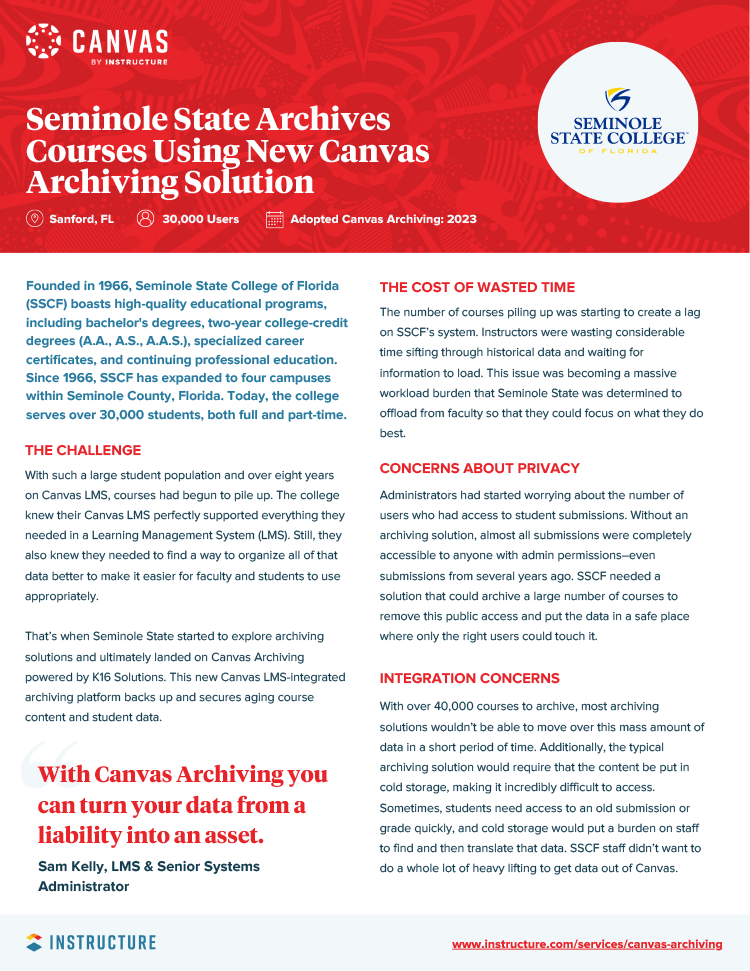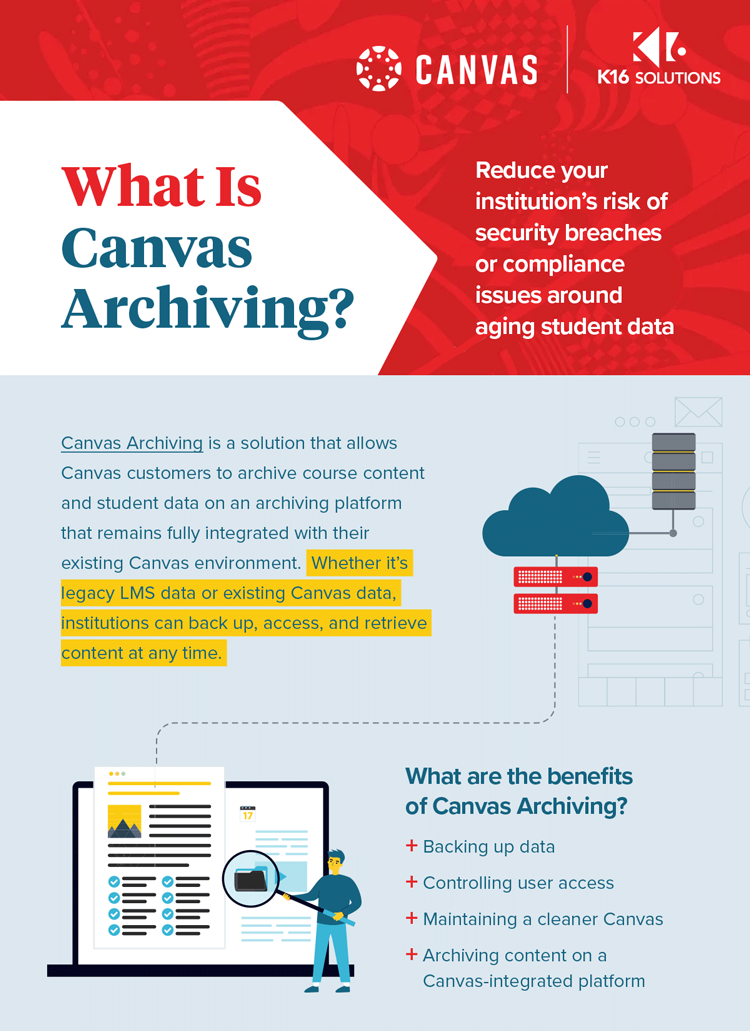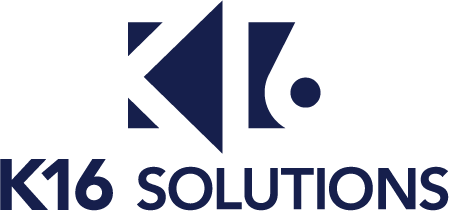How to securely archive Canvas LMS content while keeping it within reach
Collin College uses new archiving solution from K16 Solutions and Instructure

When Pamela Darling-Facio and Heather Webb-Losh went to InstructureCon in Denver last July, they were looking for a single solution to address two issues. The Collin College staffers wanted to ensure student course data could be stored safely in a secure platform while freeing up space to decrease processing time on their Canvas platform.
Darling-Facio, Director of eLearning, and Webb-Losh, Sr. Application Administrator for the North Texas-based institution, met the team from K16 Solutions, who in coordination with Instructure, had recently introduced the new Canvas Archiving solution. The tool allows Canvas customers to safely store course content and student data on a platform that remains fully integrated with their existing LMS environment.
“That gave us a leap forward in looking at the solution,” Webb-Losh says. By the time they arrived home, they were drafting a proposal for senior leadership, so they could get started.
Large student body and course catalog
Founded north of Dallas in 1985 as a community college serving roughly 5,000 students, Collin College has grown alongside the community in the booming suburbs of Frisco, Plano, Allen and McKinney. It now boasts 11 locations, along with its iCollin Virtual Campus and serves 58,000 credit and continuing education students annually, offering more than 200 degrees and certificates.
That growth has led to more than 85,000 courses in Canvas production–a large quantity of data that needed to be secure while still accessible to faculty and staff.
Practicing good data hygiene
Before so many courses and student records went online, student record storage could remain separate from course delivery. Now that institutions are delivering courses and exams through learning management systems, they must store not only content but student data like grades in a secure manner to comply with federal laws like the Family Educational Rights and Privacy Act (FERPA). Many institutions are also looking to get ahead of potential regulations like the European Union’s General Data Protection Regulation.
"In higher education, clear data governance procedures have become crucial for protecting sensitive student data and upholding the integrity of the systems we use,” says Melissa Loble, Chief Academic Officer at Instructure. “This commitment not only meets today’s legal and ethical standards but also fortifies trust within the academic community.”
Collin College’s Darling-Facio and Webb-Losh wanted to archive Canvas course data in a manner that made it safe but also accessible for administrators and faculty. Canvas Archiving powered by K16 Solutions allows them to archive course content and student data on a platform that remains fully integrated with their existing Canvas environment, so they can back up, access and retrieve content at any time.
Now, they can push archived course content to different instructors without student information and grades. “Grade information can only be viewed by an admin, and we can set the admin rights,” Darling-Facio explains.
Safe storage comes with benefits
Now that Collin College has begun implementing its new policy, Darling-Facio and Webb-Losh are purging content from the 2016-2017 and 2017-2018 academic years, while archiving content from the 2018-2019, 2019-2020 and 2020-2021 academic years. More current content will remain in active production.
This system has opened up more storage space, allows for faster processing time and makes it easier for faculty, students and administrators to find what they’re looking for, the pair says.
“We have one solution that remedies multiple problems,” Webb-Losh says, noting that she and Darling-Facio want to be prepared for any future privacy regulations. “We like to be ahead of the game,” she says, adding, “We wanted to put these things in place now so we don’t have to worry about it in the future.”
Learn all about Canvas Archiving in this short video.
“We needed a way to back up and secure our course content and data—and that's what we got. With Canvas Archiving powered by K16 Solutions, we can secure our student data, stay compliant, and remain in good standing for accreditation purposes.”

Read to learn how Canvas Archiving powered by K16 Solutions allowed Seminole State College of Florida to archive 40,000 courses in record time: Download Full Case Study
Read to learn how Canvas Archiving powered by K16 Solutions allowed Seminole State College of Florida to archive 40,000 courses in record time: Download Full Case Study
Tips for implementing an archiving solution
Moving to an archival system can require some change management within an academic environment. Sam Yaghoubi, K16 Solutions’ Senior Vice President, Partnerships and Collin College’s Darling-Facio and Webb-Losh share their suggestions for ensuring a smooth transition.
1. Work first with leadership to develop a data retention policy.
For institutions that have not yet begun archiving their courses, K16’s Yaghoubi suggests teams first develop a policy that meets federal, state and local needs.
“Through discussions with numerous institutions, it's evident that a longer data retention strategy is safer, accommodating diverse regulatory and policy requirements;” Yaghoubi says. “Best practice involves securely storing data outside the LMS, adhering to the longest required retention period, typically ranging from five to 11 years, depending on the program.”Darling-Facio notes, for example, that their fire academy requires document retention for five years.
2. Let your leadership team serve as the messenger.
Once your institution has developed a new archiving policy and plan, work with institutional leadership to convey the message and explain why the institution is undertaking it and how it will benefit faculty. Webb-Losh’s list includes key convenience factors for faculty, including reduced load times and more storage space. Her list also included the ability for deans and associate deans to conduct grade appeals while maintaining FERPA compliance.
3. Allow for plenty of time for preparation, questions, and feedback.
“We wanted to give them a lot of notice,” Darling-Facio says of the faculty. The Collin College team gave faculty two months to prepare and provided faculty with all the tools necessary to export their own courses if they were set to be archived and wanted to maintain copies for themselves.
4. Connect with your service provider if you have questions.
“The K16 Solutions team has been very helpful in addressing issues and questions and has made sure we’re on the right page,” Webb-Losh says.
5. Develop an internal system to address questions and needs before you go live.
Collin College developed a series of resources for faculty and deans ahead of its launch date. Darling-Facio and Webb-Losh have also determined which staff members will address individual issues and utilize an online ticketing system for service requests that will be easy for faculty and leadership to access. “That should help us be more successful,” Webb-Losh says.
This sponsored content is paid for and provided by K16 Solutions. The editorial team of Inside Higher Ed had no role in its creation.



